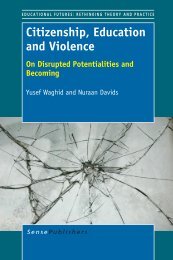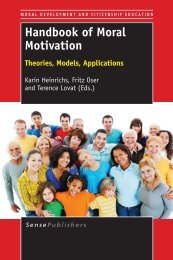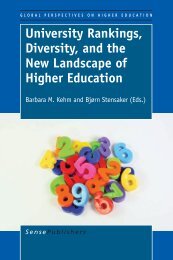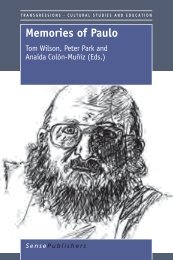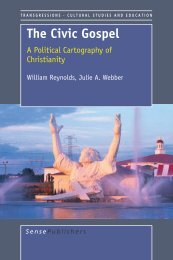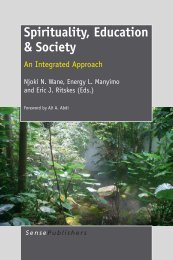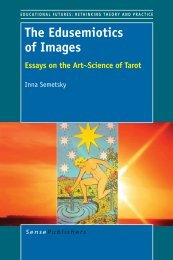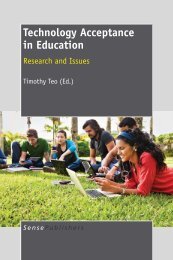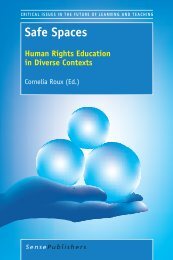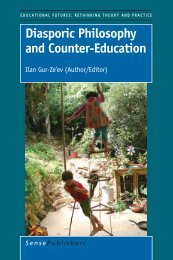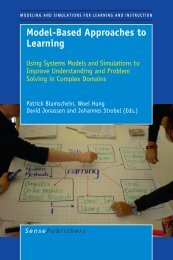Rupturing Concepts of Disability and Inclusion
Rupturing Concepts of Disability and Inclusion
Rupturing Concepts of Disability and Inclusion
You also want an ePaper? Increase the reach of your titles
YUMPU automatically turns print PDFs into web optimized ePapers that Google loves.
CHAPTER 2<br />
to underpin various human service responses will be discussed. 77 Somewhat<br />
dialectically then, having people in excluded states has enabled the outpouring <strong>of</strong><br />
charity <strong>and</strong> mercy-giving by committed members <strong>of</strong> the Church. Paradoxically,<br />
these actions by the mercy-givers have been <strong>of</strong>ten undertaken to ‘firm-up’ their<br />
belief <strong>of</strong> inclusion into the ‘Kingdom <strong>of</strong> God’. Implicit in these responses is an<br />
assumed acceptance <strong>of</strong> the marginalised positioning <strong>of</strong> people with disability<br />
within the dominant socio-symbolic order.<br />
20<br />
2.3 INTERSECTIONS BETWEEN JUDEO-CHRISTIAN AND WESTERN<br />
PHILOSOPHICAL INFLUENCES<br />
How Judeo-Christian beliefs <strong>and</strong> practices have intersected with philosophical<br />
notions <strong>of</strong> the superiority <strong>of</strong> the mind, the orthodoxy <strong>of</strong> reason, the primacy <strong>of</strong><br />
rationality, <strong>and</strong> the control <strong>of</strong> the body is <strong>of</strong> significant importance. For example,<br />
Ancient Greek culture, <strong>of</strong> which philosophers Plato <strong>and</strong> Aristotle were part, linked<br />
certain high ideals <strong>of</strong> physical beauty <strong>and</strong> healthy bodies with soundness <strong>of</strong> the<br />
mind. 78 Likewise the philosophical view <strong>of</strong> the body in ancient Greco-Roman<br />
culture connected mind (soul), body, matter, <strong>and</strong> pneuma (spirit). 79 According to<br />
Brett Webb-Mitchell, “a disabling <strong>of</strong> any part <strong>of</strong> the body would therefore affect<br />
other parts <strong>of</strong> the self, <strong>and</strong> the causes <strong>of</strong> such impairments would be seen to be<br />
from a variety <strong>of</strong> sources <strong>of</strong> physical, environmental <strong>and</strong>/or spiritual origins.” 80<br />
The Enlightenment philosophers <strong>of</strong> seventeenth century Europe challenged this<br />
particular cosmo-biological expression. The scientific method, proposed by the<br />
likes <strong>of</strong> Francis Bacon, promoted a view that the phenomenal world could be<br />
understood best by empirical investigation, replacing the authority <strong>of</strong> existing<br />
philosophical constructs <strong>and</strong> theological dogma. 81 Rene Descartes refigured the<br />
ancient Greco-Roman philosophers’ underst<strong>and</strong>ings <strong>of</strong> the relationship between<br />
mind <strong>and</strong> body when he granted superiority to the mind (“I think, therefore I am”),<br />
<strong>and</strong> granted the body the statues <strong>of</strong> the mechanical model <strong>of</strong> automata, that is, <strong>of</strong><br />
moving machines which could be studied <strong>and</strong> repaired. 82 Therefore, Descartes’<br />
dictum articulates how his perceived “radical distinction between soul <strong>and</strong> body,<br />
thought <strong>and</strong> extension implies the substantial unity <strong>of</strong> matter, whatever its form;<br />
<strong>and</strong> thought, whatever its function.” 83 As Georges Canguilhem highlights, Descartes<br />
made another significant distinction, that between humans <strong>and</strong> animals. For<br />
Descartes claimed that as “judgement is the soul’s only function, there is no reason<br />
to believe in the existence <strong>of</strong> an “animal soul”, since animals bereft <strong>of</strong> language<br />
<strong>and</strong> invention show no sign <strong>of</strong> being capable <strong>of</strong> judgement.” 84 Canguilhem<br />
continues:<br />
The denial that animals possess souls (or the faculty <strong>of</strong> reason) does not<br />
imply they are devoid <strong>of</strong> life (defined as warmth in the heart) or sensibility<br />
(ins<strong>of</strong>ar as the sensory faculties depend on the dispositions <strong>of</strong> the organs). ...<br />
Descartes does for animals what Aristotle did for slaves: he devalues them in<br />
order to justify using them as instruments. ... This attitude is typical <strong>of</strong><br />
Western man (sic). The theoretical mechanization <strong>of</strong> life is inseparable from<br />
the technological utilization <strong>of</strong> the animal. Man (sic) can claim possession



